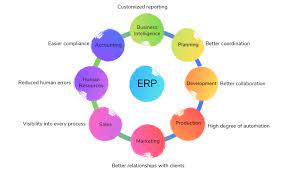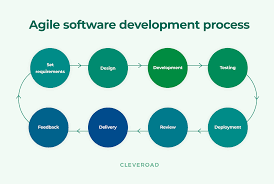Exploring the Latest Innovations in Mobile Application Development Software
The World of Mobile Application Development Software
In today’s digital age, mobile applications have become an integral part of our daily lives. From social networking to e-commerce, entertainment to productivity, mobile apps cater to a wide range of needs and interests. Behind the scenes of these innovative and user-friendly apps lies the realm of mobile application development software.
What is Mobile Application Development Software?
Mobile application development software refers to a set of tools and technologies used by developers to create, test, and deploy mobile applications for various platforms such as iOS and Android. These software solutions provide developers with the necessary resources to design, code, and optimize mobile apps efficiently.
Key Features of Mobile App Development Software:
- Integrated Development Environment (IDE): IDEs offer a comprehensive environment for coding, debugging, and testing mobile applications in one place.
- User Interface Design Tools: Tools that assist in creating visually appealing and user-friendly interfaces for mobile apps.
- Backend Services Integration: Seamless integration with backend services such as databases, APIs, and cloud storage.
- Testing and Debugging Capabilities: Features that help developers identify and fix bugs in the app during the development process.
- Cross-Platform Compatibility: Support for developing apps that can run on multiple platforms without extensive modifications.
- Analytics and Performance Monitoring: Tools that track app performance metrics and user behavior for optimization.
The Evolution of Mobile App Development Software
Over the years, mobile application development software has evolved significantly to keep pace with changing technology trends. Modern tools now offer advanced features such as artificial intelligence integration, augmented reality support, and enhanced security protocols to meet the demands of today’s app development landscape.
The Future of Mobile App Development
As mobile technology continues to advance rapidly, the future of mobile application development software looks promising. Developers can expect more sophisticated tools that streamline the app creation process further while empowering them to build innovative and engaging mobile experiences for users worldwide.
Top 6 FAQs About Mobile Application Development Software
- What is mobile application development software?
- What are the key features of mobile app development software?
- How has mobile app development software evolved over time?
- What are the latest trends in mobile application development software?
- Which programming languages are commonly used in mobile app development?
- How can businesses benefit from investing in mobile application development software?
What is mobile application development software?
Mobile application development software is a specialized set of tools and technologies that enable developers to create, test, and deploy mobile applications for various platforms like iOS and Android. This software provides developers with essential resources to design, code, and optimize mobile apps efficiently. It encompasses features such as integrated development environments (IDEs) for coding and debugging, user interface design tools for creating engaging interfaces, backend services integration for seamless connectivity, testing capabilities for bug identification, cross-platform compatibility for wider reach, and analytics tools for performance monitoring. In essence, mobile application development software serves as the backbone of the app development process, facilitating the creation of innovative and user-friendly mobile applications that cater to diverse needs and interests in today’s digital landscape.
What are the key features of mobile app development software?
When exploring mobile application development software, it is essential to understand its key features that facilitate the creation of innovative and functional mobile apps. These features typically include an Integrated Development Environment (IDE) for coding and testing, user interface design tools for creating engaging interfaces, backend services integration for seamless connectivity, testing and debugging capabilities for ensuring app quality, cross-platform compatibility to reach a broader audience, and analytics tools for monitoring performance and user behavior. These features collectively empower developers to build robust mobile applications that meet the evolving needs of users in today’s digital landscape.
How has mobile app development software evolved over time?
Mobile application development software has undergone significant evolution over time to adapt to the changing landscape of mobile technology. Initially, developers relied on basic tools and frameworks to create simple apps with limited functionality. However, as smartphones became more powerful and versatile, the demand for sophisticated mobile applications grew. This led to the development of advanced integrated development environments (IDEs) that offer a wide range of features such as drag-and-drop interfaces, real-time testing capabilities, and seamless backend integration. Furthermore, the rise of cross-platform development tools has enabled developers to build apps that can run seamlessly on multiple operating systems without the need for extensive rewrites. With each technological advancement, mobile app development software continues to evolve, empowering developers to create innovative and user-centric mobile experiences.
What are the latest trends in mobile application development software?
Inquiring about the latest trends in mobile application development software is a common query among developers and tech enthusiasts. Keeping up with the rapidly evolving landscape of mobile technology, developers are keen to explore emerging trends that shape the future of app development. Some of the current trends include the rise of low-code and no-code platforms, enabling faster app development without extensive coding knowledge. Additionally, technologies like Artificial Intelligence (AI) and Machine Learning (ML) are being integrated into mobile app development software to enhance user experiences through personalized recommendations and predictive analytics. Moreover, the adoption of cross-platform development tools and frameworks allows developers to create apps that run seamlessly across multiple devices and operating systems, optimizing efficiency and reach. Stay updated on these trends to leverage the latest innovations in mobile application development software for creating cutting-edge mobile experiences.
Which programming languages are commonly used in mobile app development?
In the realm of mobile application development software, various programming languages are commonly utilized to create innovative and functional mobile apps. Some of the popular programming languages in mobile app development include Java, Swift, Kotlin, and JavaScript. Java is widely used for Android app development, while Swift and Objective-C are preferred for iOS app development. Kotlin has gained popularity as a modern alternative for Android development due to its conciseness and interoperability with Java. JavaScript is commonly used for building cross-platform mobile apps using frameworks like React Native and Ionic. Each programming language offers unique features and capabilities that cater to different aspects of mobile app development, allowing developers to choose the best language suited for their project requirements.
How can businesses benefit from investing in mobile application development software?
Investing in mobile application development software can offer numerous benefits to businesses in today’s digital landscape. By creating custom mobile apps tailored to their specific needs, businesses can enhance customer engagement, improve brand visibility, and increase customer loyalty. Mobile apps provide a convenient platform for users to access products or services on the go, leading to enhanced user experience and satisfaction. Additionally, mobile apps can streamline internal processes, boost operational efficiency, and provide valuable insights through analytics data. Overall, investing in mobile application development software enables businesses to stay competitive, reach a wider audience, and adapt to the evolving demands of the market effectively.












